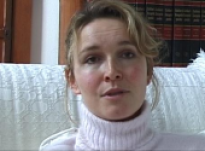Interview 61

Diagnosed with cervical cancer in 1997. Colposcopy and laser treatment given initially. From Cone Biopsy initial diagnosis stage 1A1. Six months after treatment, test results re-examined which showed stage of tumour more developed than first thought. Wertheim's hysterectomy. Ovaries not removed.
Housewife; married, 1 child.
More about me...
Nerve damage from a hysterectomy for cervical cancer left her unable to feel when she needs to urinate, so she reminds herself to go when her stomach feels full.
Nerve damage from a hysterectomy for cervical cancer left her unable to feel when she needs to urinate, so she reminds herself to go when her stomach feels full.
When having a hysterectomy for her cervical cancer she felt that losing her fertility was not an issue, but 5 years later knowing that she cannot have a 2nd child is the hardest thing to cope with.
When having a hysterectomy for her cervical cancer she felt that losing her fertility was not an issue, but 5 years later knowing that she cannot have a 2nd child is the hardest thing to cope with.
She says her friendships and family relationships have strengthened because of the support she received during her cervical cancer; she now invests more time in those special relationships.
She says her friendships and family relationships have strengthened because of the support she received during her cervical cancer; she now invests more time in those special relationships.
Talking to someone who had been through cervical cancer before her had been the most important thing that happened to her; she has since helped other women with cervical abnormalities.
Talking to someone who had been through cervical cancer before her had been the most important thing that happened to her; she has since helped other women with cervical abnormalities.
Surviving cervical cancer meant that this woman made more time for her family, which she feels was a positive thing.
Surviving cervical cancer meant that this woman made more time for her family, which she feels was a positive thing.
I used to try and do full-time work and look after my daughter and I realised that I actually didn't want to do that, that I wanted to make sure I just spent as much time as I could with my daughter. And I have had, you know, five very happy years, five and a half very happy years since, and I know that I wouldn't have had those five happy years had I not had the illness. I would've been very much more focused on my work and trying to keep my CV looking good, and I think it just helps you put things into perspective. You hear people say it but it's probably not till it really happens that, and it is that complete taking the rug from underneath your feet feel, that is horrible at the time but a huge wonderful life learning, and I think if people can hang on to the fact that it will have huge positive sides to it and keep that in mind, that they'll actually probably be pleased they've had it, it will help them with the down days really.

